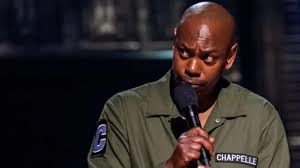It’s rare to see the year’s box office champ double up with an Oscar win for Best Picture.
The last two movies to pull off that feat? “The Lord of the Rings: The Return of the King” (2003) and “Titanic” (1997).
That captures the divide between mainstream critics and the public at large. What’s catnip to your average critic is often of little interest to Joe or Jane Sixpack. In Facebook terms, their relationship status would be, “It’s complicated.”
Lately? The two sides appear headed for a divorce.
Recent films and TV shows reveal a widening gap between the critical class and the public at large. Take “Dave Chappelle: Sticks and Stones,” the comic’s new Netflix stand-up special. The program earned a withering 35 percent “rotten” score from professional critics and a massive 99 percent “fresh” from site visitors.

Last year’s “Nanette” special, a far-left Ted Talk from “comic” Hannah Gadsby? That snared a 100 percent/25 percent split.
The trend appears to be spiking in recent weeks.
The new “Rambo: Last Blood” similarly showed the chasm between the two sides, with a 28/85 split. Brad Pitt’s sci-f think piece “Ad Astra?” Try 83/42. Gerard Butler’s action-soaked “Angel Has Fallen?” 39/93.
Critics often seek something different than the average movie goer or TV watcher. They consume endless content and crave fresh, innovative perspectives. Audiences, by comparison, cheer escapism from their daily routines.
For critics, watching TV and movies IS their daily routine.
Professional critics also have one eye on awards season, be it the Oscars festivities, the Emmys or other tony events. Would they feel comfortable praising the new “Spider-Man” sequel over an indie drama about an indigenous farmer displaced by climate change?
Hardly.
Another factor helps explain the growing distance between critics and crowds. The former, comprised of left-leaning to hard-left journalists, increasingly rank content on their social justice bona fides.
It’s not enough that “Rambo: Last Blood” isn’t as intellectually sharp as “First Blood,” the 1982 film that kicked off the franchise.
Critics hate that the film depicts a gang of murderous Mexican drug cartel types as … murderous Mexican drug cartel types. That’s downright problematic.
A large number of “Last Blood” reviews savaged the movie on those grounds, above and beyond the film’s cinematic merits.
![]() Conversely, middling fare that might otherwise snag middling reviews are suddenly viewed as empowering or necessary by critics. Take the rapturous reviews for “Hustlers,” a film featuring strippers who drug and steal from Wall Street types.
Conversely, middling fare that might otherwise snag middling reviews are suddenly viewed as empowering or necessary by critics. Take the rapturous reviews for “Hustlers,” a film featuring strippers who drug and steal from Wall Street types.
Critics adore how the movie attacks corporate USA and features copious girl power tributes. Voila! The movie earned an 88 percent “fresh” rating. Audiences don’t hate “Hustlers,” but their 66 percent “fresh” score is more reasonable.
In short, audiences rarely view movies and shows through a social justice prism.
One of the minds behind “South Park,” Matt Stone, addressed why so many critics torched “Sticks & Stones.” He gave this rationale for the vitriol:
“I feel bad for television critics and cultural critics,” he explains. “They may have laughed like hell at that, and then they went home and they know what they have to write to keep their job. So when I read TV reviews or cultural reviews, I think of someone in prison, writing. I think about somebody writing a hostage note. This is not what they think. This is what they have to do to keep their job in a social media world. So I don’t hold it against them.”
That’s both enlightened and sympathetic. Stone is wrong, though, on one crucial front. Critics may be kissing up to their editors, but that’s not their main function. They exist to serve their readers, to highlight the very best content and help them steer clear of the rest.
We only have so many hours in a day for leisure time. Anyone who helps us maximize those moments is doing a valuable service.
Critics still matter in our culture. They can rally around smaller films, like “The Peanut Butter Falcon,” that lack marketing muscle but deserve a larger audience. They see movies and TV shows days, if not weeks, before the general public. Their collective weight can be both helpful and illuminating.
Audiences, in turn, can take that information and use it accordingly.
That’s assuming critics keep their audiences closely in mind, not merely their personal politics. If they’re too busy judging content on elements apart from entertainment value, the divide, and distrust, between themselves and their readers will only intensify.
Christian Toto is the editor of the Colorado-based HollywoodInToto.com.


